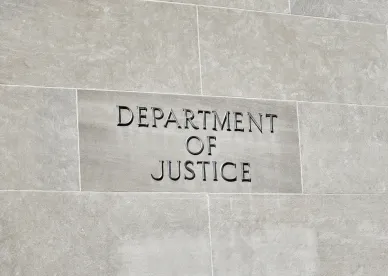Earlier this month, Assistant Attorney General Makan Delrahim announced much anticipated changes to the way the U.S. Department of Justice Antitrust Division will evaluate corporate antitrust compliance programs. These changes are memorialized in a new document titled “Evaluation of Corporate Compliance Programs in Criminal Antitrust Investigations” and also are reflected in the Justice Manual.
In Part 1 of two alerts on this topic, the takeaway from the division’s new policy is that the time is ripe for companies to consider reviewing, updating and – where necessary – tailoring their antitrust compliance programs.
In a significant reversal of long-standing policy, the division will now consider the existence of effective antitrust compliance programs at the charging stage of antitrust investigations. This means that hard-core price-fixing conspirators may avoid prosecution, even if they are not first-in whistleblowers. In the past, the division declined to consider compliance programs at the charging stage, holding that a program is ineffective, if a violation occurs.
In a nutshell, the new policy includes several changes and benefits, and guidelines for achieving those benefits:
-
The Justice Manual no longer implies that no credit is to be given for the existence of an antitrust compliance program. In practice, a charging decision must now include an evaluation of the effectiveness of a company’s compliance program.
-
A deferred prosecution agreement may now be available to a company that does not receive corporate leniency, if the company has an effective antitrust compliance program in place.
-
Two new benefits at the sentencing stage of a criminal case are now available to a company with an effective compliance program: The company’s fine may be reduced and/or the recommended length of the company’s probation period may be reduced.
Although the guidelines state that they are not to be taken as a rote “checklist or formula,” they do list (somewhat overlapping) factors that prosecutors will consider and related questions prosecutors should ask. Here are those factors and a sampling of such questions:
-
Design and Comprehensiveness – The “key considerations” aim to determine whether the program is “integrated” into the company’s business and engrained in employee practices and education.
-
What does the program look like? How and to whom is it communicated?
-
-
Culture of Compliance – The division will look to see whether managers have “clearly articulated – and conducted themselves in accordance with – the company’s commitment to good corporate citizenship.”
-
Have senior managers encouraged (or discouraged) antitrust compliance (and how)? Were they involved in the conduct at issue?
-
-
Responsibility for the Compliance Program – The division believes that for a compliance program to be “effective,” the people responsible for the program must have stature and autonomy.
-
Who is responsible for the program? Is the compliance program genuinely considered to be important when compared to other initiatives?
-
-
Risk Assessment – Certain types of businesses are vulnerable to certain types of antitrust misconduct. In the division’s view, a “well-designed” compliance program should fit with the risks associated with a company’s line of commerce.
-
Is the program tailored to the company’s particular risks? Does the company have adequate controls?
-
-
Training and Communication – A program that is nothing more than paper on a shelf is not adequate.
-
How is it disseminated? Is it understandable? How and how often are employees trained? Who is trained?
-
-
Periodic Review, Monitoring and Auditing – An effective program is subject to update and review.
-
How is effectiveness measured? How and by whom is a program audited?
-
-
Reporting – Reporting should be anonymous and frictionless.
-
Is reporting easily made and incentivized? Does the company carefully monitor reporting for patterns and red flags?
-
-
Incentives and Discipline – An effective program must be accompanied by “systems of incentives and discipline,” if it is to be fully integrated into a company’s cultural fabric.
-
How are antitrust violations treated when measured against other types of policy violation? What happens to culpable executives?
-
-
Remediation and Role of the Compliance Program in the Discovery of the Violation – A compliance program may not prevent every violation, but when one is detected, remedial efforts can strengthen the program.
-
What role did the program play in uncovering a violation? Is firm leadership involved in revising the program?
-







 />i
/>i

